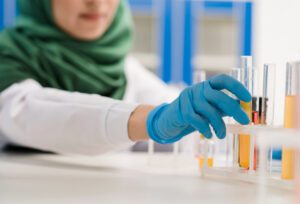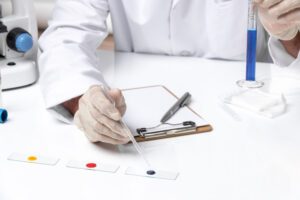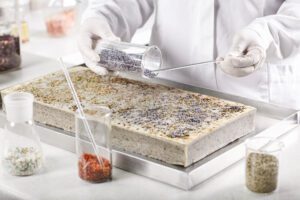What services does Middle East Testing Services (METS Lab) provide, and how do they help businesses with environmental sustainability?
Middle East Testing Services (METS Lab) is a leading provider of advanced biodegradation testing, specializing in evaluating the environmental impact of various materials, products, and chemicals. Our advanced laboratory is outfitted with the latest technology and complies with globally recognized standards to evaluate the biodegradability of products across various industries. Through our thorough biodegradation testing, METS plays an essential role in assisting businesses to ensure their products meet environmental sustainability standards while reducing their ecological impact.
What is biodegradation and how significant is it for your products?
Biodegradation refers to the process through which natural organisms (e.g., bacteria, fungi, and plants) break down complex organic substances into simpler compounds, often resulting in water, carbon dioxide, and biomass. In the context of products and chemicals, biodegradation testing determines how long it takes for a material to decompose naturally in the environment and whether the process leaves harmful residues.
As concerns about pollution and environmental sustainability grow, biodegradation testing has become essential for assessing the lifecycle of products, especially those that are disposable or used in large quantities. The goal is to understand whether these materials break down into harmless byproducts, or if they persist in nature, potentially contributing to pollution and harming ecosystems. Products that are non-biodegradable or take an excessively long time to degrade (like plastic) are often criticized for their environmental impact, making biodegradation testing even more relevant. Biodegradation testing is applied in numerous industries, including waste management, pharmaceuticals, plastics, food packaging, and others
What is the role of a testing laboratory?
Biodegradation testing laboratories are essential for evaluating the impact of products and materials towards the environment. Based on the international standards ISO 14855-1:2012, ISO 17088:2021, ASTM D5338-15, OECD 301 etc. testing laboratories are assessing how substances decompose in natural settings, primarily through the activity of microorganisms like bacteria, fungi, and algae. This process is vital for determining whether a product is environmentally safe, sustainable, or potentially harmful to ecosystems due to its persistence..
What are the types of biodegradation testing?
There are different types of biodegradation tests, each designed for specific environments or conditions. The two main categories are:
- Aerobic Biodegradation Testing: This type of testing occurs in the presence of oxygen, simulating the conditions found in most natural environments such as soil, compost, and aquatic systems. Oxygen supports the growth of microorganisms that decompose organic materials. Aerobic biodegradation is typically faster and more efficient than anaerobic biodegradation. Common standards for aerobic biodegradation testing include:
- OECD 301: Biodegradability of chemicals and organic materials in
- ISO 14851: Determination of the ultimate aerobic biodegradability of plastic materials in an aqueous medium — Method by measuring the oxygen demand in a closed respirometer
- ISO 14855-1: This standard provides guidelines for testing the biodegradability of materials under controlled conditions, typically in composting environments
- Anaerobic Biodegradation Testing: This occurs in environments where oxygen is absent, such as in landfills or deep Anaerobic microorganisms break down organic material, producing methane, carbon dioxide, and sometimes hydrogen. This testing is important for understanding how materials degrade in conditions where oxygen is limited.
Common standards for anaerobic testing include:
- OECD 311: Anaerobic biodegradability of organic compounds in digested sludge by measurement of gas production.
- ISO 11734: Evaluation of the ultimate anaerobic biodegradability of organic compounds in digested sludge — Method by measurement of the biogas production
Why Choose Middle East Testing Services?
- Accredited and Compliant: Our laboratory complies with international standards, including ISO 14855- 1:2012, ISO 17088:2021, and ASTM D5338-15. We follow rigorous procedures to ensure the reliability and accuracy of our biodegradation tests, providing clients with trustworthy results that meet global sustainability
- Expertise and Experience: METS boasts a team of skilled professionals with extensive experience in biodegradation testing. Our experts are well-versed in the complexities of biodegradation processes and can provide insightful analyses tailored to your specific products and requirements.
- Comprehensive Reporting: We deliver detailed, easy-to-understand reports that include the biodegradation rate, the extent of disintegration, and any potential environmental Our comprehensive data helps clients make informed decisions regarding product design, sustainability practices, and regulatory compliance.








No comment yet, add your voice below!